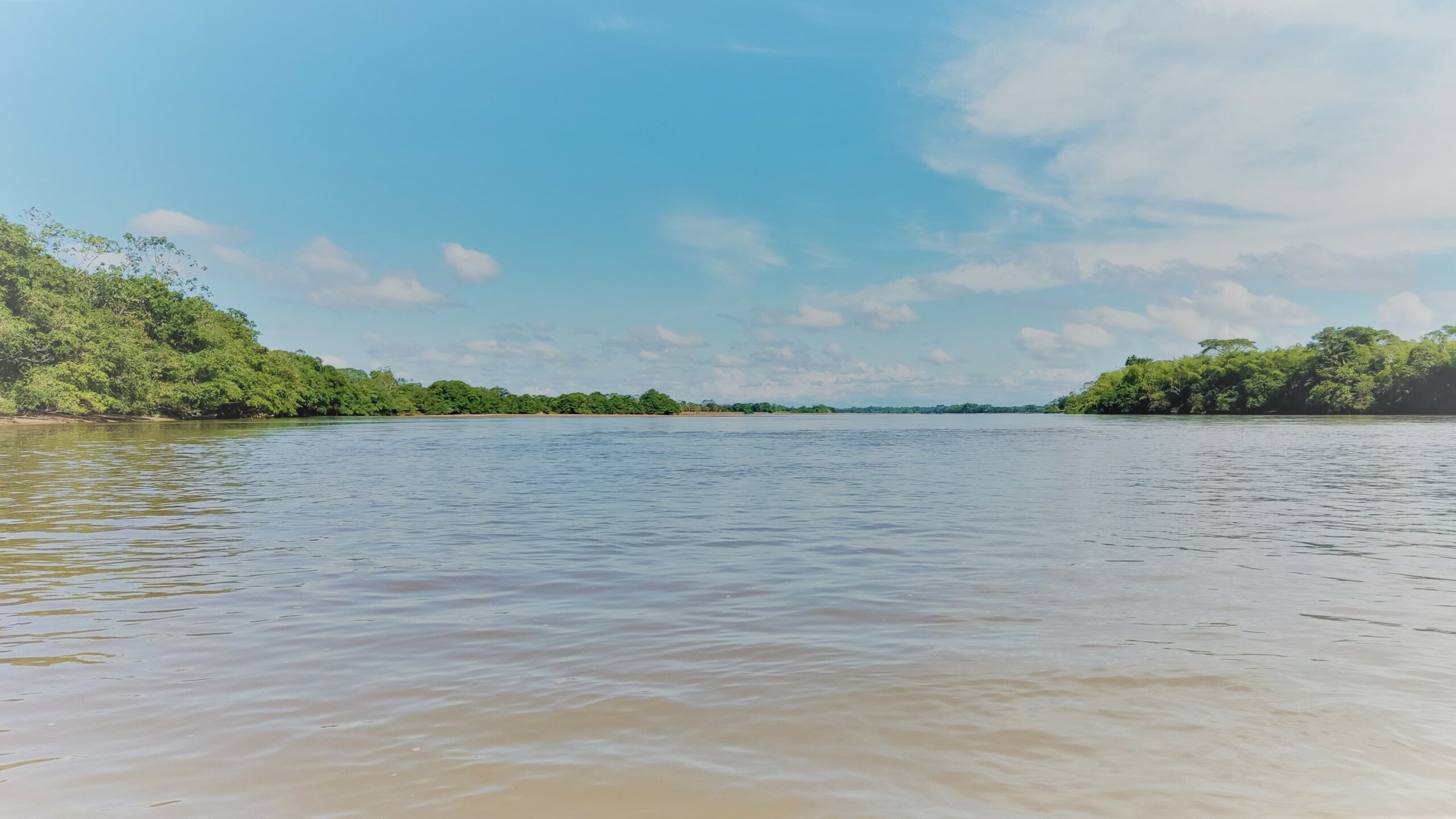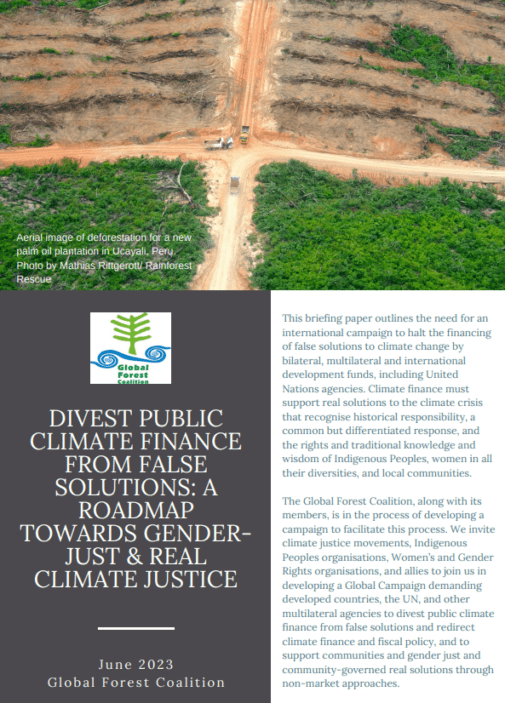A ‘Code Red’ for Humanity: Climate Land Ambition and Rights Alliance Statement on COP26

The science is clear: we are facing “Code Red for Humanity.” COP 26 started with soaring rhetoric promising to ‘keep 1.5 alive.’ Once again though, this COP has failed to listen to science and give credence to the peoples’ voices ringing outside the negotiating rooms of the COP and those taking to the streets calling for climate justice.
One bright spot, however, is the agreement on the Glasgow Committee on Non-Market Approaches and the forthcoming work program. CLARA is committed to seeing these approaches succeed in order to enable enhanced cooperation on mitigation and adaptation in order to provide communities with the support they need for climate action. But the market based mechanisms in the rest of Article 6 risk undermining real climate action with offsets that do nothing to enhance ambition to keep temperature rise below 1.5 (see more below).
Failures continue
Six years after adoption of the Paris Agreement, and more than a decade after the initial commitment, developed countries have failed to fulfill their climate finance pledge of $100 billion per year for the developing countries recognizing their historical responsibility for the climate crisis. Despite this continued failure, COP 26 did not bring with it new commitments or even a delivery plan to meet the pledge immediately or how to cover the shortfall.
The UK presidency, after spending much of this summer talking up the potential of COP 26, failed to persuade Parties to sufficiently raise ambition. There is no way to meet the Paris Agreement goals and say 1.5°C is still alive without reducing emissions by 45% from 2010 levels by 2030. The outcome of this COP in no way demonstrates a real commitment to meet that crucial target.
Rich countries, especially the United States, once again blocked needed action to set up a financing mechanism for loss and damage. These parties fail to recognize their historic responsibility for the climate crisis and block needed ambition.
Calls for Equity, Ambition and Paradigm Shift
It is not new for a COP to witness a plethora of new pledges and commitments made by developed countries and various non-state actors, often using the COP premises, but outside the purview of multilateral climate actions. These parallel actions fail to address the inherent inequity that these promises propagate, their exclusionist nature, and the real impacts they may have on the rights of Indigenous Peoples and local communities (IPLCs), women, farmers, fisherfolks and workers who are the most climate impacted, but least responsible for causing the crisis.
CLARA members are clear that the need for immediate climate action cannot be accelerated through false hopes and solutions embedded in the mad race for nature based solutions and net zero pledges.
Article 6 Outcome Fact Sheet
CLARA members are deeply concerned that the decision on the Article 6 mechanisms creates such significant loopholes that they could eliminate any remaining opportunity to get the world on a 1.5C pathway.
- Good: Only a Non-Market approach based on science informed Ambition and historically informed Equity can save Humanity and our planet from Code Red.
- Good: CLARA welcomes the forward and positive movement to push for a non-market climate mechanism through Article 6.8 and urges Parties to further strengthen the work programme and expedite its time bound implementation to address the need for joint mitigation and adaptation measures, technology transfer, capacity building and mobilization of additional public finance to raise ambition and address inequity, further exacerbated by the COVID pandemic.
- Medium: The operative texts across Article 6 incorporate language on human rights, including the rights of Indigenous Peoples, but weakly and fail to include human rights in key elements such as 6.4 activity design and to include references to essential international standards, including Indigenous Peoples’ right to free, prior and informed consent.
- Bad: Major risks remain that these mechanisms will contribute to trading nothing more than hot air and will exacerbate the climate crisis by allowing governments and corporations to continue business as usual, albeit under a plethora of new standards and accounting rules.
- Bad: All the while, they risk irreversible impacts on nature – land, forests, and oceans – and the vulnerable and marginal communities that they nurture – Indigenous Peoples and local communities, women, fisherfolks, farmers, and workers.
- Bad: Markets and climate policies dictated by corporates and carbon traders, have, as their primary objective, reducing the costs of mitigation in the private sector. Such a narrow and self-serving objective will never be able to realize transformative social,
economic and environmental changes. We need a paradigm shift. We need immediate phasing out of fossil fuels. Nature should not become the engine of new commodity creation in the form of carbon offsets that can never offset fossil fuel use. We need full support, fair share and adequate finance for grounded climate action led by the climate vulnerable frontline communities. - Bad: Article 6.4’s adoption could give way to a flood of speculative money into carbon, disconnected from the underlying natural assets on which the credits are based. The emergence of a ‘subprime’ market for cheap credits is a serious concern that has barely been considered by Parties. But the International Emissions Trading Association continues to argue for measures that create conditions for trading carbon globally.
- Bad: The rules allow for carry-over of zombie emissions reductions credits from the CDM dating back to 2013 allowed for use in countries’ first NDCs.
- Bad: Weak commitment to the overall mitigation of global emissions (OMGE) with no mandatory requirement to cancel credits from 6.2 to contribute to OMGE and only a requirement to automatically cancel 2% from 6.4.
- Bad: Irrespective of the outcomes of the Article 6 negotiations, recognizing the climate science and keeping the benchmark of 1.5 degree in mind, CLARA strongly believes that carbon markets, offsets and Kyoto Protocol style CDM, rebranded as a sustainable development mechanism, are counter-productive responses to Code Red.
QUOTES FROM MEMBERS OF CLARA
Souparna Lahiri, Climate Policy Advisor, Global Forest Coalition:
COP26 has failed to deliver the much awaited “course correction”. The UNFCCC and the UK Presidency has succumbed to the delaying tactics of the global north while giving into the carbon trading and politically powerful fossil fuel lobby, propagating false solutions and net zero, by handing over climate mitigation to carbon markets, corporate land grabbers and carbon colonialists. The Parties to such agreements have not only compromised on the much-needed ambition, equity and emission reduction, but have infringed on the right to life and livelihood of the already vulnerable indigenous peoples and local communities, women, youth, peasants and fisherfolk that conserve and nurture our land, forests and oceans. 1.5 Degree, the CODE RED, for survival of our Mother Earth, is breached.
Steve Suppan, Ph.D., Senior Policy Analyst, Institute for Agriculture and Trade Policy (IATP):
It is encouraging that the COP will at long last begin to implement Article 6.8 and finance adaptation for the most climate vulnerable countries. However, given the exclusion, in nearly all cases, of land-based offsets from the Science Based Targets Initiative’s Corporate Net Zero Standard, it is very disturbing that the COP will decide to implement Article 6.2 and 6.4 not as an international cooperation mechanism to achieve Overall Mitigation of Global Emissions (OMGE) along a 1.5⁰ C pathway, but as a framework for a Party/private sector emissions offset credit market. That market will provide the underlying assets of global emissions offset futures and swaps trading without OMGE obligations and beyond COP oversight.
Clara Alibert, Right to food and Climate Advocacy Officer, Secours-Catholique-Caritas France (SCCF):
The question of the respect of human rights shouldn’t have been secondary in article 6 negotiations! However, when reading the final text, this is indeed the case. The language is too weak and not operationalizing enough, no reference to the free, prior and informed consent of indigenous peoples, no reference to human rights international standards… This final result is disappointing when we know the dangers that carbon markets pose to communities that are least responsible for climate change.
Myrto Tilianaki, Climate Justice Advocacy Officer, CCFD – Terre Solidaire:
The adoption of Article 6 and the creation of carbon markets undermines the integrity of the Paris Agreement by making markets and carbon offsetting a lever for action. Carbon offsetting jeopardizes the 1.5°C target. It is no coincidence that the big polluters increased their net zero announcements and promoted carbon markets during COP26: it allows them to continue their ‘business as usual’ without taking ambitious climate action.
Gry Bossen, Political Coordinator at Forests of the World:
After six years of negotiations on the development of a market mechanism, time has run out for the idea that one can pay off one’s emissions by buying greenhouse gas reductions elsewhere in the world. Therefore it is disappointing that the parties in Glasgow have insisted on developing a market mechanism that there really isn’t any room for in our climate fight. And even more so one that risks making room to trade with hot air that has no climate effect, and at the same time allow governments and companies to continue to emit as they usually do. It is the complete opposite of what the Paris Agreement prescribes.
Erika Lennon, Senior Attorney at the Center for International Environmental Law (CIEL):
Bad rules on Article 6 will gut ambition. Rules related to carbon trading ultimately govern how actions implemented under the Paris Agreement might impact people and ecosystems. In rushing to a deal in Glasgow, where many voices were excluded from the rooms, negotiators reached an agreement that while including critical references to upholding human rights, including the rights of Indigenous Peoples, also fails to fully respect international human rights standards, including Indigenous Peoples’ right to free, prior and informed consent; allows for risky carryover of junk credits from the failed Clean Development Mechanism (CDM); and opens loopholes to unauthorized credits to flood in — including a surge of new credits based on false climate solutions. The loopholes engineered in Glasgow risk undermining real climate action with offsets that do nothing to enhance ambition to keep temperature rise below 1.5°C and will only serve to intensify the climate emergency, posing a significant threat to the enjoyment of human rights.
Peter Riggs, Pivot Point:
This decision did not bring us closer to 1.5 degree pathways, nor did it do much to address the serious lack of adaptation funding. The final parts of the Paris Rulebook were completed, particularly Article 6, but finished in such a way that doesn’t guarantee a strong mitigation benefit. We do however warmly welcome adoption of the non-market mechanism of Article 6.8 – perhaps the one outcome from the COP that shows new true ambition.
Teresa Anderson, climate policy coordinator, ActionAid International:
The text frames the overall mitigation target in a very worrying way. The language of ‘net zero by 2050’ is so oversimplified that it is easy for countries and corporations to get away with doing nothing to cut emissions for decades. The ‘net’ of net zero is an accounting trick that means that this outcome will likely drive a desperate hunt for land for new tree plantations to suck carbon dioxide out the air. This will likely displace communities in the global South – smallholder farmers, indigenous peoples, women and girls, who suffer yet again to fix a problem they never caused. There isn’t enough land on the planet to offset all the emissions hidden in net zero targets, so this target is setting us up for failure, land grabs – or likely both.
Source: https://www.clara.earth/








